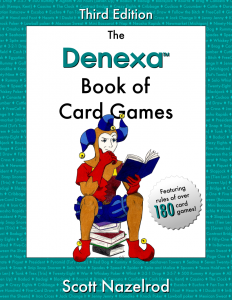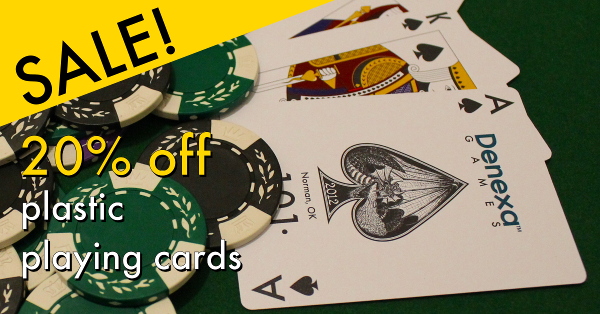Democracy
Democracy is a trick-taking game for two to six players. Although its precise origins are not known for sure, it is popular at the Tabletop Board Game Cafe in Cleveland, Ohio, and has been played there since at least 2004. It seems plausible that the game originates from Cleveland, perhaps being invented by one of the cafe’s patrons.
Unlike most card games, Democracy has a backstory: the players play the part of colonial powers attempting to annex an island inhabited by four tribes, which are represented by the four suits. The countries decide to resolve the question of which one of them will gain control of the island by putting it up to a vote of the people of the island. The night before the vote, though, the countries kidnap a few members of the tribes under cover of darkness, not knowing for sure which members of which tribes they’ve captured. The day of the vote, the captured tribal members make impassioned speeches in favor of the countries that have captured them—presumably under threat of death, of course. Thus, the name Democracy is certainly intended to be firmly tongue-in-cheek. Of course, the “speeches” are the tricks played by the players, and the winner of the trick is the card that have the “most persuasive speech”.
Democracy is often played with very loose adherance to the rules. When played this way, the game play is more akin to a roleplaying game like Dungeons & Dragons than to a traditional card game. In some games, the rules are entirely negotiable; the cards carry only a suggestion of value, with the players’ tribespeople arguing in support of the nation holding them in the form of verbal speeches given by the players! While a higher-ranking card has innate advantages over the lower-ranked cards, a well-received speech by a charismatic player might well take the trick regardless of whether it was the highest-ranked card played. We recommend sticking to the rules to start out with, but if you wish to add these roleplaying elements to the game later, have at it!
Object of Democracy
The object of Democracy is to capture, through trick-taking, a majority of points in as many suits as possible.
Setup
Democracy is played with a modified 52-card deck with a number of cards added or removed depending on the number of players. Starting with a deck of Denexa 100% Plastic Playing Cards:
- For two, three or five players, remove the 2s, leaving a 48-card deck (3 through ace in all four suits).
- For four players, remove the 2s and add two jokers, creating a 50-card deck.
- For six players, remove the 2s and add one joker, creating a 49-card deck.
Shuffle and deal amongst the players and an extra hand, called the voting pool:
- For two players, twelve cards.
- For three players, eight cards.
- For four players, six cards.
- For five or six players, four cards.
This deal is called the first day.
Rank of cards
In Democracy, the cards rank in an unusual order. The 5, 4, and 3 are moved from their normal spots to become the highest three cards in the game. So the full rank of cards is: (high) 5-4-3-A-K-Q-J-10-9-8-7-6 (low).
In the game’s story, each rank is linked with a social class within each of the tribes. Each card also has a point value:
- 5: the chief (five points)
- 4: the chieftainess (four points)
- 3, A: the warriors (three points)
- K, Q, J: the hunters (two points)
- 10, 9, 8, 7: the farmers (one point)
- 6: the village idiot (zero points)
Game play
Each trick begins with the dealer turning the top card of the voting pool face up; this card, the upcard, determines the trump suit for the trick. Each player then chooses a card to play to the trick and places it face down in front of them. Unlike in most trick-taking games, there is no requirement to follow suit or trump if possible—the player may select any card they desire. Once everyone has played a card, on the count of three from the dealer, all players simultaneously turn their cards face up.
The trick is won by the highest trump played to the trick, unless both the 5 and 6 of trump are present, in which case the 6 wins over the normally unbeatable 5 of trump. If no trump is played to the trick, the highest card played wins the trick. (Note that the actual ranks of the cards determines who wins the trick, not the cards’ point values; kings and queens are both two-point hunter cards, but a king still beats a queen.) A player winning the entire trick places the cards comprising it, including the upcard, into a face-down won-tricks pile. In the event that two cards of different suits tie for highest, each player simply wins their own card and the upcard is discarded.
Jokers are wild for any card other than a trump. In practice, this usually means that they represent a non-trump 5, and will win the trick unless a trump or another 5 is played to the trick. Captured jokers do not score anything; playing them is simply an attempt to capture the actual scoring cards in a trick.
After the hands have been exhausted, the first day is concluded. The dealer then distributes the cards for the second day, discarding any leftover cards. After the second day is played, the entire island is scored. Each player looks through their won-cards pile and tallies the point total of the cards captured. If a player captures thirteen or more points of a given suit (i.e., more than half), they score that tribe (essentially, a victory point). All four tribes may not be scored for a particular island, especially in larger games, as the cards may be split evenly enough that no one player scores thirteen points.
After scoring an island, the deal rotates, the cards are shuffled, and the first day of a new island is dealt. Keep playing islands until one player scores five tribes. That player is the winner.



Leave a Reply